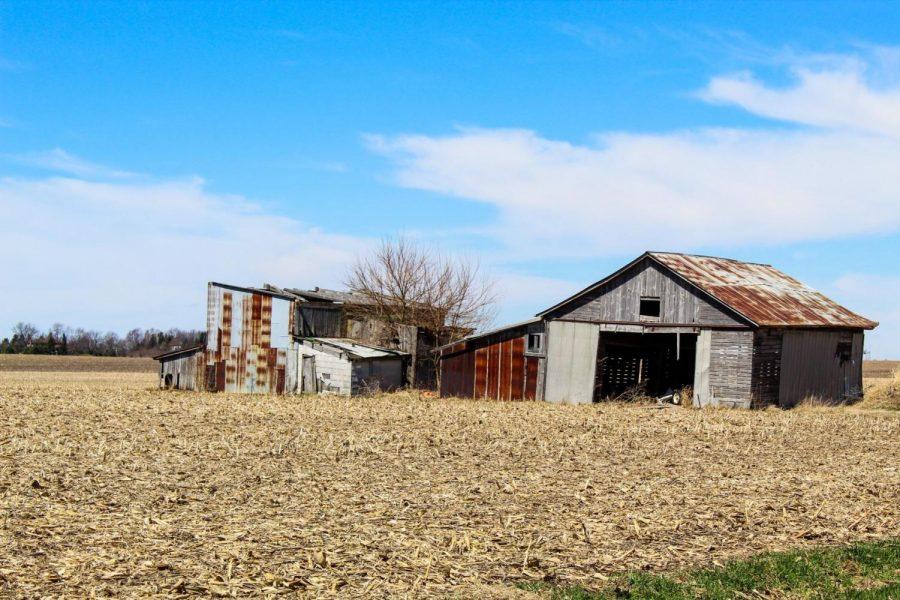Wind turbines create more problems
April 11, 2019
When driving through DeKalb, people may notice large white signs painted with a slash through a turbine and wonder why some could be against an eco-friendly, energy-saving option. Turbines are still negatively impacting the DeKalb community. They are a hazard to the environment, steal profits from farmers and disrupt neighborhoods, even though DeKalb has recently passed legislation to aid the issue.
The DeKalb County Board passed a final wind ordinance in November 2018 during its meeting at the DeKalb County Farm Bureau. After nine months of deliberation, the board voted 19-3 in favor of the ordinance, according to a Nov. 21 Daily Chronicle article. The ordinance included two amendments made by County Board member Maureen Little, bringing back the wind ordinance sections originally mandated there be zero shadow flicker from the turbines with stricter noise complaints.
The 300-feet turbines cost roughly $3-$4 million to be installed and can generate energy for upward of 25 years, according to the Solar Guide.
A wind farm is capable of generating enough electricity to power more than 54,000 homes. However, each turbine in the farm stands at 262 feet tall from the ground to the center of the blade, according to the American Wind Energy Association.
Dave and Stephanie Hulthen, a DeKalb couple currently living on a wind farm, travel to neighboring counties to share their concerns with residents, according to the Knowledge Stream website. The wind farm is negatively impacting their quality of life, according to KHQA, a local ABC 7 affiliate source.
“We are exposed to shadow flicker,” Dave said. “That’s where the turbine comes between the sun and our residence. We have a flickering in the morning where it could go for 45 minutes.”
Intense flickering invading your home in the morning would be a nuisance. The flickering is a moving shadow caused by the blades of the turbine reflecting the sun, according to a Turbine Generator post.
The sound of the turbines is also quite loud.
“[The noise is] like a jet plane just sitting on the property,” Stephanie said. “Not flying overhead and leaving, but always sitting out there spinning. It’s a hum, hum, hum — a low frequency drum noise.”
On top of the negative environmental impact, the turbines are impacting neighborhoods and locals who live too close to the farms.
“[DeKalb resident] Kim Tindel said there are around 30 turbines within five miles of her residence, with the nearest tower located around 1,400 feet from her home. Tindel said she has documented items in her house shaking,” according to a May 2017 National Wind Watch article.
Tindel also said that it causes her whole house to shake.
This is not the only issue with turbines. While turbines convert wind into energy, this process is not always successful. Wind can only produce energy when blowing between 10 and 33 mph, according to the Willowind Energy website. Wind speed reduction can occur at any time, meaning backup generators must always be ready to replace the turbine, or the energy outage could cause major blackouts.
Turbines are unreliable and expensive. They cause environmental issues such as killing thousands of birds annually, including the protected species bald eagles. The blades also strike and kill thousands of bats, according to the American Bird Conservancy.
Previously an Illinois lower court denied a motion to dismiss a complaint challenging the special use permit for a wind farm approved by the DeKalb County Board in 2010, according to Renewable Energy Law Update.
. This means in 2010 DeKalb residents complained to the court about the wind farms and were denied. When the wind energy industry wants to expand to a new region, the county or sometimes state, it may formulate new zoning and permitting laws to address the siting of wind turbines, according to Windustry.
Acres of farmland are used for these energy converters, causing farmers to lose income from their crop sales, according to an April 2017 Des Moines Register post. These turbines are taking much more away than they are producing for the DeKalb community.







